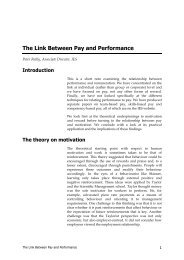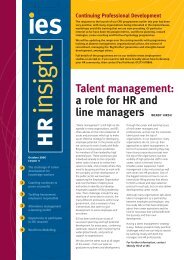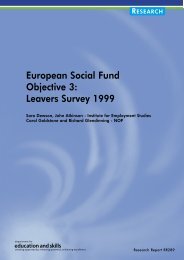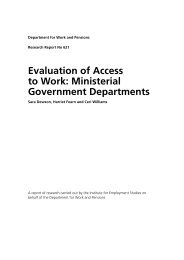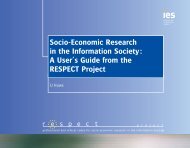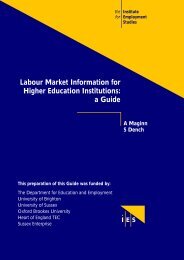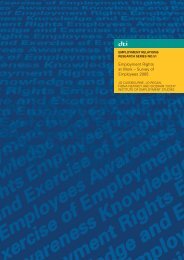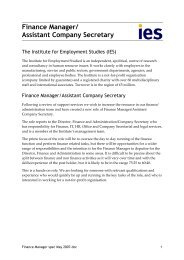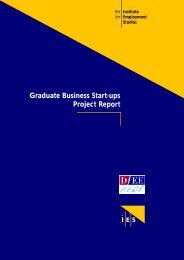PDF of this item - The Institute for Employment Studies
PDF of this item - The Institute for Employment Studies
PDF of this item - The Institute for Employment Studies
- No tags were found...
Create successful ePaper yourself
Turn your PDF publications into a flip-book with our unique Google optimized e-Paper software.
10 <strong>The</strong> HR Agenda <strong>for</strong> 2010<strong>The</strong>se are examples <strong>of</strong> flexible working necessitated by recession, but what willhappen after recession? Will we all go back to ‘normal’ with the majority <strong>of</strong> menworking full time and flexible working slipping back to being the preserve <strong>of</strong> theworking mum? What benefits will organisations have found from flexible working?Will they recognise that flexibility can have productivity and other business benefitseven in the good times? It is a bit like the situation <strong>for</strong> women in the World Wars.Women who had worked to cover <strong>for</strong> the men folk who were away at war did not allwant to relinquish their roles on the men’s return. Will more men (as well as women)want to retain their flexible status?Flexible working – the past<strong>The</strong> Right to Request flexible working <strong>for</strong> people with children under 6 (or childrenwith a disability under 18) has been in place since 2003. This has subsequently beenextended to people with children under 16, or <strong>for</strong> those with caring responsibilities.<strong>The</strong> nature <strong>of</strong> the introduction <strong>of</strong> the Right to Request, based as it was aroundchildcare, has meant the majority <strong>of</strong> those who have taken up flexible working havebeen women. Even in organisations which have extended their flexible workingschemes to all staff, the pattern is usually the same. <strong>Studies</strong>, such as that produced byWorking Families (Flexible Working and Per<strong>for</strong>mance 2008), have found thatanecdotally, managers value their flexible workers and report a positive relationshipbetween flexible working and per<strong>for</strong>mance. However, many organisations find thattheir flexible workers receive poorer outcomes in the per<strong>for</strong>mance managementprocess and are less likely to receive the top per<strong>for</strong>mance awards. Flexible workersare just not seen as committed and flexible working has been described by many as‘career suicide’. In IES’s 3rd Work Life Balance Survey <strong>for</strong> BERR (2007) we found thatmen are more likely to request flexible working <strong>for</strong> work‐life balance reasons, not <strong>for</strong>childcare. <strong>The</strong>ir flexibility is more to do with lifestyle choice and not the necessity <strong>of</strong>childrearing. So, while women may opt <strong>for</strong> flexible working knowing they aremaking a career sacrifice, they feel <strong>this</strong> is the price to be paid and there is little choice.Men, still responsible <strong>for</strong> the majority <strong>of</strong> the family’s income, cannot take the risk ifthey do not have to.<strong>The</strong> outcome, as IES found in the 3rrd Work Life Balance Survey, is a lot <strong>of</strong> frustratedmen who want to work fewer hours and would like to request flexible working butwho cannot do so because <strong>of</strong> the risk <strong>of</strong> sacrificing their career aspirations. Some menwant flexibility – when the survey asked ‘Would you prefer to work fewer hours, if itmeant earning less money as a result?’ 31% <strong>of</strong> men said yes, compared to 21% <strong>of</strong>women. <strong>The</strong>re is also a growing divide between men and women because <strong>of</strong> flexibleworking, where the flexible workers, the women, become less visible, less well paidand are less likely to be promoted. As a consequence, flexible working becomes moreand more the preserve <strong>of</strong> women and is seen as unsuitable <strong>for</strong> men (who are also



